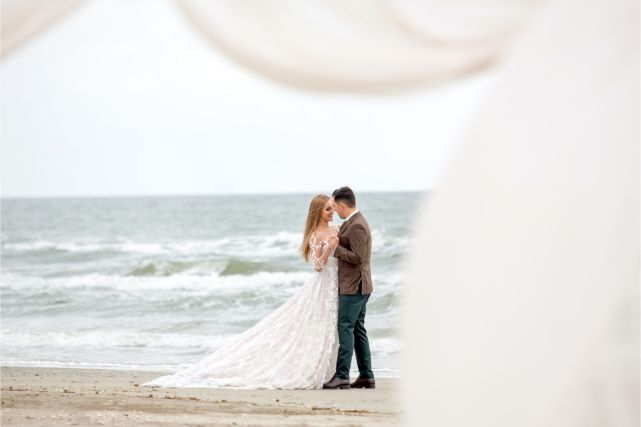
5 Common Mistakes to Avoid When Planning Your Wedding
Knowing What to Avoid in Planning Your Wedding

Your wedding day represents a milestone in your life, culminating in love, commitment, and shared dreams. It’s a day marked by anticipation and joy, but the journey leading up to it is not without its challenges. Wedding planning, while exciting, can be a complex and demanding process that requires careful consideration and strategic decision-making.
As you embark on creating your perfect day, it’s essential to recognise the significance of this undertaking. Beyond the ceremony, wedding planning is about crafting an event that mirrors your unique love story—a celebration that will be etched in your memories forever.
The dichotomy of joy and stress in wedding planning is palpable. The excitement of choosing colours, selecting a venue, and envisioning the day you’ve always dreamed of is accompanied by the challenges of coordinating myriad details, managing budgets, and navigating potential pitfalls.
This guide will delve into five common mistakes couples often encounter during wedding planning. These pitfalls, if not addressed proactively, can detract from the joy of the occasion. However, armed with insights and strategies, you can navigate these challenges successfully, ensuring a smooth and memorable wedding experience. Let’s explore how to sidestep these common pitfalls and make your journey to the altar as seamless and enjoyable as possible.
Mistake #1 – Lack of Budget Planning

We are not establishing a realistic budget
One of the couples’ most prevalent mistakes in wedding planning is neglecting to set a realistic budget. The absence of clear financial boundaries can lead to overspending and unnecessary stress. To mitigate this, start by comprehensively evaluating your overall budget, breaking it into categories such as venue, catering, attire, and decorations.
Discuss the importance of setting a budget early on
Setting a budget early in planning is crucial for guiding your decision-making. It allows you to prioritize expenses and allocate resources wisely. Clearly defining financial limits prevents overspending and enables you to focus on elements that genuinely matter to you as a couple.
Tips for creating a comprehensive budget
Create a comprehensive budget by researching the average costs of various wedding elements. Factor in unexpected expenses and maintain a realistic financial situation. Utilise budgeting tools and spreadsheets to track expenditures, providing a transparent overview throughout the planning process.
Examples of potential oversights in budget planning
Standard directions in budget planning include underestimating hidden costs, failing to account for fluctuating vendor prices, and neglecting to plan for unforeseen circumstances. Awareness of these potential pitfalls prepares you to manage your budget effectively and make informed decisions.
Wedding Invitation Components

We are not finalising the guest list in advance.
Neglecting to finalise your guest list early in the planning process can lead to various challenges. The number of guests directly influences your budget, choice of venue, and overall logistical considerations.
Emphasize the impact of guest count on budget and venue selection
A more extensive guest list often means a higher budget and a more spacious venue. Consider the intimate atmosphere you desire and align it with your budget constraints when finalizing your guest list.
Strategies for creating and managing a guest list
Create a structured plan for your guest list by categorising guests into priority tiers. This approach helps you make informed decisions if adjustments are necessary due to budget constraints. Utilise digital tools or spreadsheets to manage and organise guest information efficiently.
Common pitfalls and how to avoid them
Common pitfalls in guest list management include inviting guests out of obligation, not considering venue capacity, and procrastinating on finalizing the list. Mindful consideration of these pitfalls ensures your guest list aligns with your vision and budget.
Mistake #3 – Last-Minute Vendor Booking
Waiting too long to book vendors
Last-minute vendor booking is a significant mistake that can result in limited choices and added stress. Quality vendors often have busy schedules, and procrastination can lead to disappointment.
Importance of early vendor selection and booking
Early vendor selection is crucial for securing the services of reputable professionals. Research vendors well in advance, read reviews, and schedule meetings to discuss your vision. This proactive approach ensures that you have the best options available.
Tips for researching and choosing reliable vendors
Thoroughly research potential vendors, paying attention to reviews, portfolios, and testimonials. Seek recommendations from friends, family, or your wedding planner. Schedule meetings to discuss your expectations and ensure a good fit before finalizing agreements.
Consequences of last-minute decisions
Last-minute decisions can lead to compromised quality, higher costs, or even the unavailability of your preferred vendors. Planning is crucial to securing vendors aligning with your vision and budget, ensuring a smoother, stress-free process.
Mistake #4 – Overlooking the Weather

Failing to consider weather conditions
Overlooking the impact of weather conditions is a common oversight, particularly for outdoor weddings. Failing to plan for different weather scenarios can result in discomfort for you and your guests.
Discuss the significance of weather in outdoor weddings
Weather plays a crucial role in the overall experience for outdoor ceremonies and receptions. Be mindful of the season and climate, considering potential rain, heat, or cold. Having a backup plan is essential to ensure a seamless event.
Tips for planning for different weather scenarios
Plan for various weather scenarios by choosing a venue with indoor and outdoor options. Provide accommodations like shade, heaters, or umbrellas to keep guests comfortable. Monitor weather forecasts for timely adjustments in the weeks leading up to your wedding.
Backup plans and contingencies
Establish clear backup plans and contingencies to address unexpected weather challenges. This may include renting a tent, having indoor backup spaces, or adjusting the timing of outdoor events to avoid extreme weather conditions.
Mistake #5 – DIY Overload

Taking on too many do-it-yourself projects
The allure of personalizing your wedding with do-it-yourself (DIY) projects is undeniable, but taking on too much can lead to stress and exhaustion.
Discuss the appeal of DIY projects.
DIY projects add a personal touch to your wedding and can be a source of pride. However, balancing personalization and practicality is essential to avoid overwhelming yourself.
Caution against overwhelming oneself with DIY tasks
Be realistic about your DIY capabilities and the time required for each project. Avoid taking on too many jobs that could detract from your enjoyment of the planning process and the wedding day.
Select a few meaningful DIY projects that align with your skills and interests. For other aspects, consider professional services to ensure a polished outcome. This balance allows you to personalize your wedding without sacrificing your well-being.
Makeup Ideas for Your Wedding
When planning your makeup and hairstyle for your wedding, it’s essential to consider a few key factors to ensure you look and feel your best on your special day. Here are some tips to guide you through the process:
- Research and Inspiration: Gather inspiration from magazines, Pinterest, Instagram, and bridal websites. Look for styles that resonate with your taste and the theme of your wedding.
- Consider Your Dress and Wedding Theme: Your makeup and hairstyle should complement your dress and the overall theme of your wedding. For instance, a bohemian-style dress might pair well with loose, natural waves and soft, glowing makeup.
- Trial Run: Schedule a trial run with your hair and makeup artists. This is crucial to see how the look comes together and make any necessary adjustments. Bring pictures of your dress and any hair accessories you plan to use.
Hair Considerations
- Length and Texture: Consider your hair’s length and texture. Certain styles work better with long hair, while others are perfect for shorter distances.
- Updo or Down: Decide if you want your hair up, down, or combined. Updos are elegant and keep your hair out of your face, while down styles can be romantic and soft.
Makeup Considerations:
- Skin Tone: Choose makeup shades that complement your skin tone.
- Long-lasting Products: Opt for durable, waterproof products to ensure your makeup stays put throughout the day.
- Natural vs. Glamorous: Decide if you want a more natural look or something glamorous. It’s essential that you still feel like yourself.
- Accessories: Think about any hair accessories you want, such as tiaras, veils, or floral crowns. Make sure they fit well with your hairstyle.
- Comfort and Practicality: Your wedding day will be long, so ensure your hairstyle and makeup are comfortable and practical for the entire day.
- Take Care of Your Skin and Hair: In the months leading up to your wedding, take good care of your skin and hair. Consider professional treatments and maintain a good skincare routine.
- Communication with Your Stylist: Have open communication with your stylist. Make sure they understand your vision and can execute it to your liking.
- Stay True to Yourself: Most importantly, choose a style that makes you feel beautiful and confident. Your wedding day is about celebrating you and your partner, so it’s essential that you feel like the best version of yourself.
Conclusion

As you embark on the exciting wedding planning journey, we hope this guide has provided valuable insights into steering clear of common pitfalls. Your wedding day is a celebration of love, and by prioritizing essential elements like budgeting, guest lists, vendor selections, weather considerations, and DIY projects, you pave the way for a seamless and joyous celebration.
To enhance your wedding experience further, consider entrusting your bridal beauty needs to Tina Kristen Weddings. Our professional makeup services are tailored to complement your unique style, ensuring you look and feel radiant on your special day. Let Tina Kristen Weddings be part of your wedding story, and let us enhance your beauty for a truly memorable celebration. Contact us today to schedule your wedding makeup consultation and take the first step towards a flawless and stunning bridal look.
FAQs
Q: What is the ideal timeline for wedding planning?
The ideal timeline for wedding planning varies, but a standard recommendation is to start planning 12 to 18 months before the wedding date. This allows ample time for venue selection, vendor bookings, and other essential preparations.
Q: How can we create a realistic wedding budget?
Creating a realistic wedding budget involves assessing your financial situation, researching average costs for wedding elements, and using budgeting tools. Track your expenses throughout the planning process to stay within your budgetary limits.
Q: What are some common pitfalls in guest list management?
Common pitfalls include inviting guests out of obligation, not considering venue capacity, and procrastinating on finalizing the list. To avoid these pitfalls, categorize guests by priority and be mindful of your budget and venue limitations.
Q: Why is early vendor booking crucial for a wedding?
Early vendor booking is crucial because reputable vendors often have busy schedules. Research vendors in advance, schedule meetings, and secure agreements to ensure you have the best options available for your wedding day.
Q: How can we prepare for unexpected weather on our wedding day?
To prepare for unexpected weather, choose a venue with indoor and outdoor options, provide necessary accommodations, and establish clear backup plans. Monitor weather forecasts leading up to the wedding to make timely adjustments.
